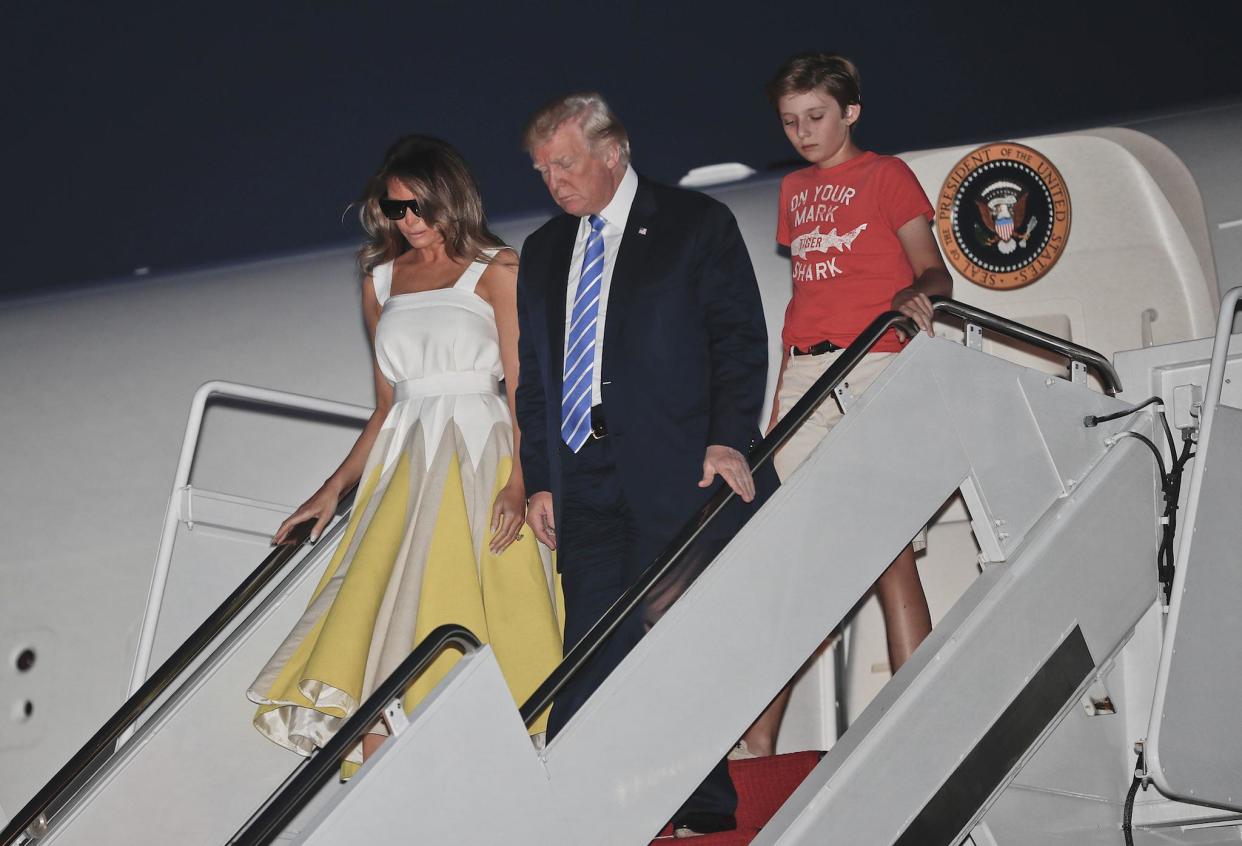Trump returns to full in-tray after 17-day 'working vacation'

Donald Trump has returned to Washington to a full in-tray of agenda items as his White House continues to deal with the fallout from recent controversies.
During his first chaotic seven months in office, Mr Trump’s administration has repeatedly been embroiled in issues related to staff shakeups, investigations into Trump campaign advisors’ alleged ties to Russia, and the President’s own off-the-cuff remarks and tweets – all of which have appeared to distract from his policy agenda.
“Heading back to Washington after working hard and watching some of the worst and most dishonest Fake News reporting I have ever seen!” the President tweeted on Sunday night after a 17-day “working vacation”, which he mostly spent at his golf club in New Jersey.
The President on Monday will address the American public about the “path forward for America’s engagement in Afghanistan”. After months of reported disagreements between his advisors on the issue, Mr Trump is expected to raise troop levels, carrying on the nearly 16-year-old conflict in the country.
“The president has made a decision,” US Defence Secretary James Mattis told reporters. “As he said, he wants to be the one to announce it to the American people.” During his presidential campaign, Mr Trump repeatedly questioned the purpose of the US’s involvement in Afghanistan.
In the speech from Fort Myer, in Arlington, Virginia, Mr Trump is also expected to discuss the America’s approach to South Asia, particularly Pakistan, which Washington has accused of encouraging extremists.
Mr Trump’s address comes amid fallout from his comments last week suggesting that white supremacists, neo-Nazis and other hate groups did not deserve 100 per cent of the responsibility for deadly violence that engulfed Charlottesville, Virginia earlier this month.
Critics said that Steve Bannon, Mr Trump's former chief strategist, had had an influence on the President's remarks equating white supremacists and neo-Nazis with the left-wing demonstrators who opposed them at the rally.
Mr Bannon, reportedly already planning to resign, was dismissed from the White House on Friday.
But there remains the question of whether the Mr Bannon’s departure will alienate the Mr Trump’s base of supporters. The 63-year-old was said to embody the the populist movement at the centre of the President’s agenda and is credited as being one of the key players that helped Mr Trump win the 2016 election.
Along with dealing with national security matters upon his arrival back in Washington, the President is also expected to prepare for legislators’ return to Capitol Hill in September.
Mr Trump has yet to secure a legislative victory and spent some of his “working vacation” blasting Senate Majority Mitch McConnell for failing to win enough support from Republicans for a healthcare overhaul in July.
One of Mr Trump’s key campaign promises was to repeal and replace the Affordable Care Act, otherwise known as Obamacare, a pillar of his predecessor Barack Obama’s legacy.
Congress this autumn is largely expected to focus on tax reform and passing a new government funding bill by 30 September to prevent a government shutdown on 1 October.
In the budget bill, Mr Trump is hoping to win funding for the construction of a wall at the US’s southern border as well as money for infrastructure to build roads, bridges, railways, waterways, tunnels and highways.
“We will end up getting healthcare,” Mr Trump said last week at a news conference that derailed after he said there was “blame on both sides” for the violent rally in Charlottesville.
“But we’ll get the infrastructure. And actually, infrastructure is something that I think we’ll have bipartisan support on. I actually think Democrats will go along with the infrastructure.”

 Yahoo News
Yahoo News 
